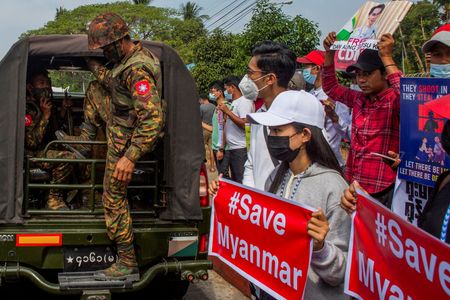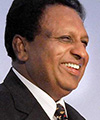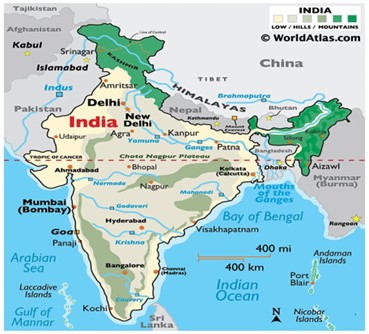
Ne Win’s Ghost Still Haunts Myanmar

If Adolf Hitler, Joseph Stalin and Benito Mussolini who ruled their respective countries in the first half of the twentieth century visit Germany, Russia and Italy today, they will not recognize the lands they controlled with iron hands. There is no trace of their systems and their legacies are best forgotten by the next generation of their former subjects.
But if Ne Win, President of Burma in the second half of the same century visits Myanmar, he will feel proud of his legacy. He will find his ghost everywhere, a military dictator in charge, the democratic leader Aung San Suu Kyi (ASSK) and the opposition in prison, no friends abroad except China, a patient people who protest occasionally and then withdraw into their shells and a large chunk of the country run by ethnic groups. The current dictator, like Ne Win, claims to be friendly to India, but does not lift a little finger to strengthen relations. Ne Win will find the name of his country and its capital changed, but he will know that even the new names are a regression to the past.
For me, who spent 1983 to 1986, much of the time as the Indian Charge d’ Affaires, during the Ne Win regime, it will be De ja Vu all the way if I go there now as nothing much seems to have changed. After reading the learned assessments of my successors and scholars at the time of the first anniversary of the military coup of Feb 1, 2021, I can well believe that history stopped in Burma with Ne Win’s coup of 1962. It was a long and painful walk back for the country ever since. Not only was democracy wiped out, but the country was turned into a garrison, where every one that ran the country was a soldier. Many of them were in civilian clothes, but on the Army Day, they turned out in military uniforms with their rank badges. No other dictator has militarized a country as much as Ne Win has done. The tradition continues even today. Old habits die hard and it explains the unbearable dictatorship which has evolved over the years.
Diplomats did not have much to do in Myanmar. Foreign office meetings were not there except for protocol purposes and no informal conversations were possible with high officials except on the golf course. The annual golf tournament between diplomats and Burmese officials was the only occasion we could meet the top brass socially. They were trained in telling jokes so that they did not have to talk business. As far as India was concerned, all the leftover problems of the expulsion of a million Indians in 1962 were frozen. Trade was only on the border and following political developments in Myanmar was easy with two tabloid English papers owned by the Government with identical content.
We bought some quantities of rice from Burma just to set the ball rolling in trade. It led to a visit by the Commerce Secretary, the inimitable Abid Hussein and a return visit to India by the Burmese Commerce Minister, but nothing else happened because of the Burmese policy of not having to do anything with Super Powers and neighboring countries. Only “third countries”, like Japan, Germany and Korea could do business, apart from China, which was an exception to all rules.
The only time I saw Ne Win at close quarters was when he visited India on a condolence visit soon after the assassination of PM Indira Gandhi. He was all charm and friendliness with PM Rajiv Gandhi and promised him a new chapter in India-Burma relations. I was asked to prepare a comprehensive plan for cooperation in all fields, which was handed over to the Burmese, but nothing was heard about it till I left. A golf handicap and some roles in the Rangoon Theatre Club productions by the British Ambassador and a few Burmese favorites of Ne Win were my only takeaways.
Many things happened in the world and Myanmar itself since I left in 1986, but nothing much has changed in its system of Government or status in the world. The present military leader Min Aung Hlaing appears to be as dictatorial and ruthless as Ne Win was and the military had the upper hand even when ASSK shared power with the army and he had no qualms to throw her in jail on trumped up charges since February 2021.
Conflict and tension continue between the armed forces and the National League for Democracy (NLD) and civilian deaths have been mounting. The GDP has declined by 18% and investors are gradually leaving the country. Different ethnic groups are holding sway in different parts of the country and flourishing through smuggling and other activities. In the last one year, the road map for restoring some form of participatory Government has been destroyed. The promised elections have been delayed at least till 2023 and Hlaing has no intention to begin a democratic process.
The army has been proposing a form of proportionate representation in the next elections to enable the army to maintain its stranglehold. A shadow National Unity Government (NUG) exists, but even an armed rebellion cannot oust the army, which has 350,00 soldiers on duty. The political epitaph of ASSK has been written as she has no choice left, but to surrender to the will of the army. The National Ceasefire Agreement (NCA) is not likely to hold for long. Ethnic groups controlled by China are waiting in the wings to exploit the situation.
The Association of South East Asian Nations (ASEAN) has been desperately trying to implement a five- point consensus for a cessation of violence and establishment of peace and reconciliation. But the army has remained adamant, accusing ASEAN of foreign intervention. The Cambodian leader, Hun Sen was the first foreign leader to visit Myanmar after the coup, but Hun Sen himself was opposed to invite Hlaing to an ASEAN conference. Hun Sen has suggested the visit of an ASEAN special envoy to visit Myanmar. Hlaing may receive the envoy, but remain adamant on retaining power.
At the UN, China and Russia have prevented strong condemnation of the regime, but even they have not been able to secure the Myanmar seat for the military regime. China has great stakes in Myanmar and it wields tremendous influence in the army through supplies of arms and flourishing trade. Many Chinese have settled in different parts of Myanmar and are engaged in farming and industrial activities. China does not encourage Russia and India to get any foothold in Myanmar.
India has major interests in Myanmar, but since 1962, our relations are, at best, formal. Our emotional attachment to ASSK has been long abandoned, but there are lingering doubts about our links with her. We have decided to work with ASEAN and Cambodia, but there are little prospects of restoration of democracy or constructive dialogue. All courtesies were extended to Foreign Secretary Shringla, including a meeting with Hlaing during his recent visit to Myanmar, but nothing concrete was expected to happen.
Long ago, I was talking to Ratu Mara, the PM of Fiji about Myanmar from where I had moved to Fiji as the Indian High Commissioner. After hearing my analysis, he asked me “Why are they so patient?” I hazarded a quick guess and said it must be because they were Buddhists. Ratu Mara thought for a while and said conspiratorially: “Mr. High Commissioner, why don’t you take back all the Hindus from Fiji and send me Buddhists?”
As for any dialogue with the military, it is like talking to a stone wall. I went to Myanmar on “a fact -finding mission” on behalf of Nelson Mandela’s Elders. Some middle level military man met me and politely heard me out and the only response to my message from the Elders to have reconciliation with ASSK was: “Please give our respects to Nelson Mandela and his colleagues.”
The world and the people of Burma have been very patient with the military junta and are ready for a dialogue, but that unfortunate land continues to be haunted by the ghost of Ne Win to lead it to greater chaos and misery.
***********************
Disclaimer
The opinions expressed in this article are the author’s own and do not reflect the views of Chanakya Forum. All information provided in this article including timeliness, completeness, accuracy, suitability or validity of information referenced therein, is the sole responsibility of the author. www.chanakyaforum.com does not assume any responsibility for the same.
Chanakya Forum is now on . Click here to join our channel (@ChanakyaForum) and stay updated with the latest headlines and articles.
Important
We work round the clock to bring you the finest articles and updates from around the world. There is a team that works tirelessly to ensure that you have a seamless reading experience. But all this costs money. Please support us so that we keep doing what we do best. Happy Reading
Support Us





















POST COMMENTS (0)